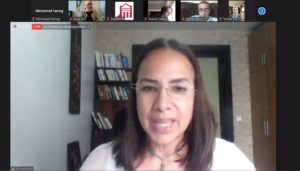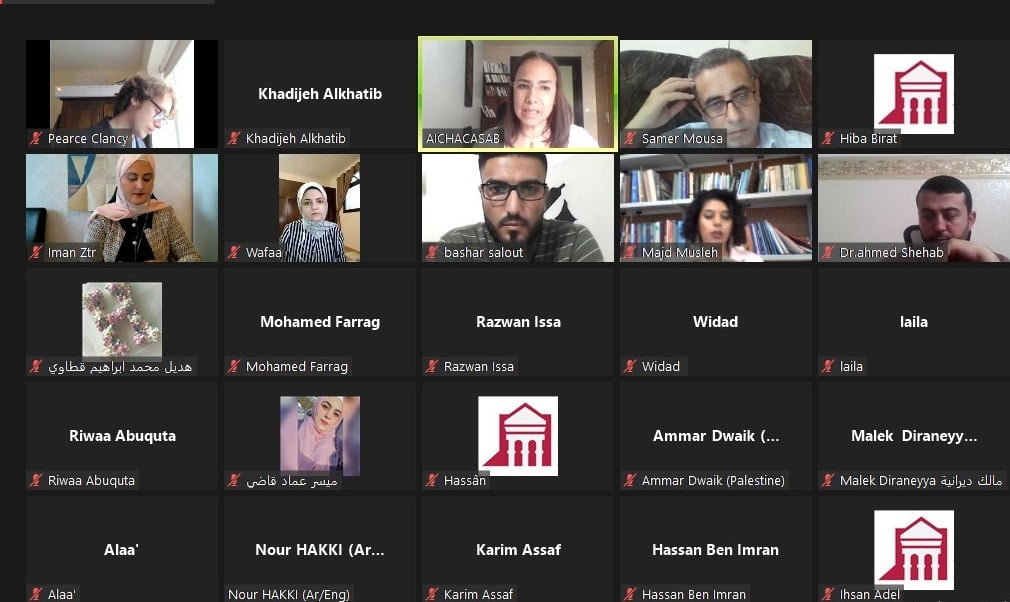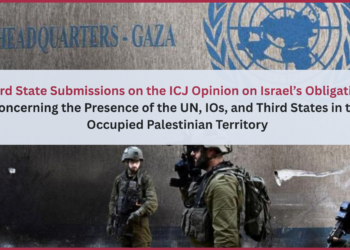United Kingdom_Law for Palestine (L4P) organized a panel discussion within the monthly webinars of the “Jurists for Palestine Forum”. The panel discussion titled, “The Prospects of the Cause of Palestine at the International Criminal Court: What’s Next?”, discussed the status quo of the International Criminal Court and the prospects for investigating crimes related to the issue of Palestine, especially within the mandate of the new prosecutor Karim Khan. The panel also discussed the political, legal and logistic challenges facing the Court to investigate Israeli crimes against the Palestinians, and the impact of the Pre-Trial Chamber’s decision on increasing international and moral pressures on Israel.
The discussion was held on Sunday, August 22, 2021, via zoom, and hosted Dr Aicha Al-Basri, a Moroccan writer and journalist, a former diplomat to the United Nations and an international human rights consultant, and Mr Pearce Clancy, a lawyer and a PhD researcher in international law (Ireland) and a former researcher specializing in the international criminal law/ ICC with Al-Haq Palestinian organization. The discussion was composed of 27 academics, jurists and activists from several countries, and was moderated by Iman Zuaiter, the coordinator of the Jurists for Palestine Forum and human rights researcher. Outside zoom, the discussion was followed by around 850 members of the Jurists for Palestine Forum from around the world.

The ICC Reform Program Questions the Remote Investigation
Dr Aicha Al-Basri began her intervention by shedding light on the status quo of the International Criminal Court in terms of the interference between the legal and political standards both structuring the court, the weak capacity of the prosecution, and the pressures and threats exerted by the Israeli and American authorities on the court in order to stop the investigation in oPts.

Al-Basri spoke about the role of Karim Khan, the new court’s prosecutor, as he fully adopts the court’s reform program, and develops very high standards for investigations compared to the previous prosecutors (Bensouda and Ocampo), especially after reassuring that the experts’ report for reforming the court will be a roadmap for reforming the prosecutor’s office and deciding which investigations to prioritize. Al-Basri also indicated the extent to which the Palestinian cause might be affected by Khan’s vision, who does not prefer remote investigation, as he seeks to present strong cases that include decisive evidence before the court. Meanwhile, since Israel declared its total refusal to cooperate with the court, investigation on the ground in Palestine seems impossible.
Al-Basri concluded her talk by referring to the way of benefiting from the ICC investigation to serve the Palestinian national liberation project, through pushing the prosecutor’s office to focus on Israeli crimes confirmed internationally as illegal such as Apartheid and settlements.
International Thunderous Effect
On his side, Mr Pearce Clancy spoke in his intervention about the consequences of the ICC’s decision to open a formal investigation in Palestine. Clancy noted that the Court gave the space to many Palestinian victims for their voices to be heard through their lawyers and provided some vindication to those who suffered the improper and excessive use of force in the 2014 Israeli military offensive on the Gaza Strip and during the civilians killed and injured while taking part in the Great March of Return Peaceful protests in 2018–19, as well as those Palestinians displaced by the construction and expansion of the illegal Israeli settlements since 2014. However, Clancy believes that the cause will not reach the point of arresting Israeli suspects and bringing them before the court. This scenario is unrealistic even under the best conditions according to him.

The forum’s participants discussed issues such as the effectiveness of the ICC to get Palestinian rights back, ways to avoid prosecuting Palestinian resistance leaders rather than Israeli criminals, ways to draw the ICC’s attention to the crime of apartheid, and ways to tackle the Israeli refusal to cooperate with the ICC.
This webinar comes within the monthly meetings of the Jurists for Palestine Forum, affiliated with the Law for Palestine Organization. The Forum is holding online monthly webinars gathering international experts and researchers, students, jurists and people interested in Palestine from different countries of the world to discuss topics and developments related to international law and Palestine, in addition to effectively networking between jurists interested in Palestine from all over the world.
* To attend the next monthly webinars of Jurists for Palestine Forum, you can register via the following link “here“
You can watch the full panel discussion here.





